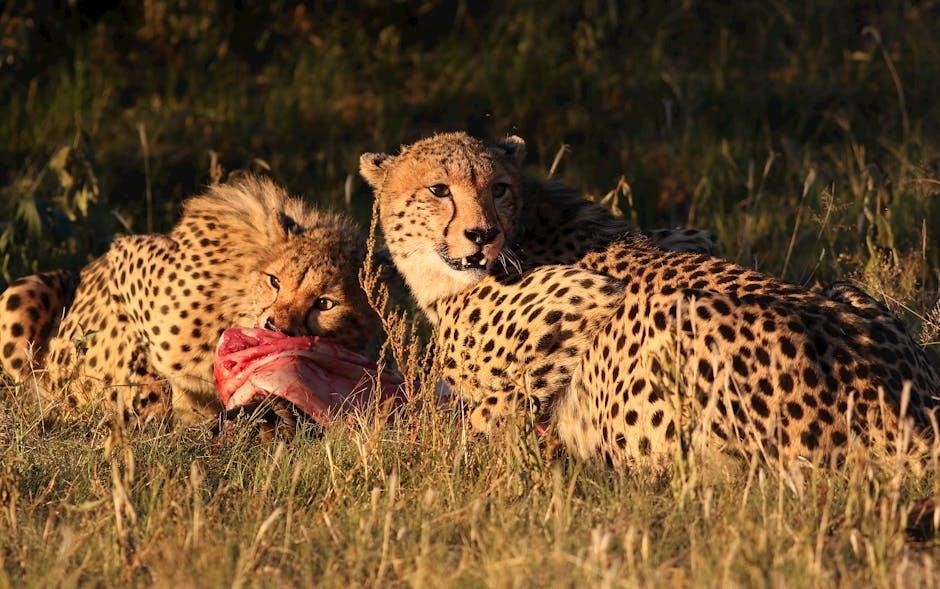How to Become a Hunting Guide
Becoming a hunting guide requires obtaining licenses‚ gaining experience‚ and mastering essential skills. Start by getting a state license‚ then build knowledge of wildlife and terrain. Gain experience by assisting outfitters and learning from seasoned guides. Develop skills in first aid‚ firearms safety‚ and navigation. Network with other professionals to grow your reputation and client base.
Understanding the Role of a Hunting Guide
A hunting guide is responsible for ensuring a safe and successful experience for clients during hunting trips. Guides must be knowledgeable about wildlife behavior‚ terrain‚ and local regulations. They lead hunters‚ often on foot or horseback‚ and assist with tracking and harvesting game. Guides also assess clients’ physical and medical needs to ensure safety. Building trust and clear communication are essential‚ as guides must manage client expectations and provide expert advice; The role requires patience‚ adaptability‚ and the ability to teach both novice and experienced hunters. Guides often work long hours in challenging outdoor conditions‚ making physical fitness and mental stamina critical. Success in this role depends on balancing the pursuit of game with ethical hunting practices and environmental respect. Understanding the guide’s responsibilities helps aspiring professionals prepare for the demands of this rewarding career.
Obtaining Necessary Licenses and Certifications
Becoming a licensed hunting guide requires completing specific legal and regulatory steps. Start by obtaining a hunting guide license from your state’s wildlife agency‚ such as the Department of Land and Natural Resources in Hawaii. Applications are typically available at local wildlife offices. Ensure you meet all state-specific requirements‚ which may include background checks‚ liability insurance‚ and first aid certifications. Some states also require completion of a guide training program or passing a written exam. Additional certifications‚ such as firearms safety and emergency response training‚ may be mandatory or highly recommended. Research your state’s regulations thoroughly‚ as licensing requirements vary. For example‚ Colorado emphasizes knowledge of local ecosystems and wildlife management. Once licensed‚ stay updated on annual renewals and continuing education requirements. Proper credentials are essential for legal operation and building client trust. Failure to obtain necessary licenses can result in fines or inability to work as a guide. Always verify requirements with local authorities before starting your guiding career.
Gaining Extensive Knowledge and Experience
Gaining extensive knowledge and experience is crucial for becoming a successful hunting guide. Start by building a deep understanding of hunting techniques‚ wildlife behavior‚ and local ecosystems. Spend ample time in the field to develop skills in scouting‚ tracking‚ and field judging game like elk. Many aspiring guides begin by working as assistants or wranglers for established outfitters‚ learning the ropes and gaining hands-on experience. Knowledge of the terrain‚ including maps and navigation‚ is essential for leading clients safely and effectively. Additionally‚ understanding wildlife management practices and conservation efforts will enhance your expertise. Continuous learning through programs like Colorado’s Elk Hunting University can provide valuable insights and improve your guiding skills. Experience also involves understanding client needs‚ adapting to different hunting conditions‚ and mastering the art of communication. The more time you spend in the field‚ the better equipped you’ll be to handle challenges and deliver memorable hunting experiences. Building a strong foundation of knowledge and experience will set you apart as a competent and reliable guide.
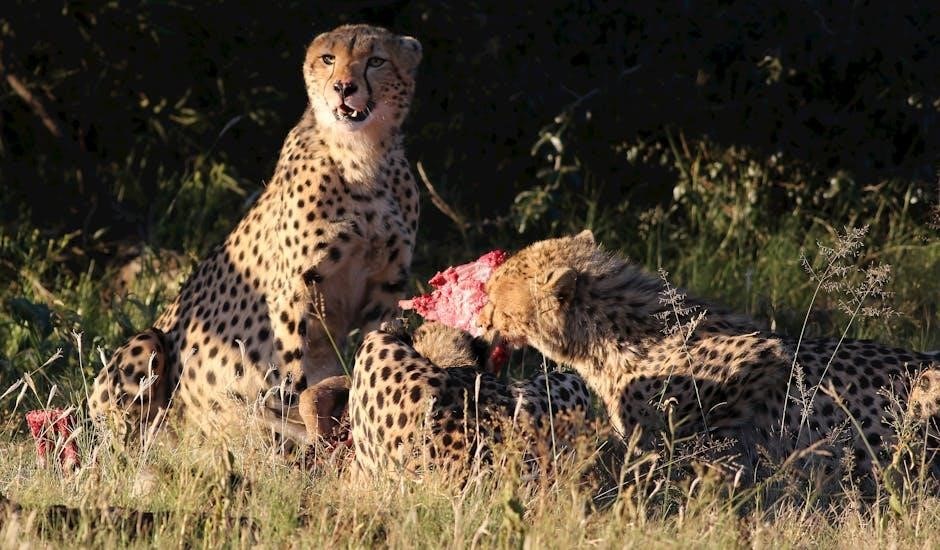
Developing Physical and Mental Fitness
Developing physical and mental fitness is essential for a hunting guide‚ as the role demands endurance‚ strength‚ and resilience. Guides often hike long distances‚ carry heavy gear‚ and work in challenging terrain‚ requiring a high level of physical stamina. Building cardiovascular endurance through activities like hiking‚ running‚ or cycling is crucial. Strength training should focus on muscles used for carrying packs‚ climbing‚ and navigating rough terrain. Mental fitness is equally important‚ as guides must remain calm under pressure‚ think critically‚ and make quick decisions in unpredictable situations. Practicing mindfulness or meditation can help improve focus and composure. Additionally‚ guides must be prepared to handle emergencies‚ making first aid and emergency response training vital. A strong physical and mental foundation ensures guides can lead clients safely and effectively‚ even in demanding conditions. Regular exercise‚ a healthy diet‚ and adequate rest are key to maintaining the energy and resilience needed for this demanding profession. By prioritizing fitness‚ aspiring guides can build the stamina and mindset required to excel in the field.
Building a Strong Network and Reputation
Building a strong network and reputation is crucial for success as a hunting guide. Start by connecting with experienced outfitters and guides‚ as they can offer valuable mentorship and opportunities. Many outfitters prefer hiring individuals who have gained experience as wranglers or assistant guides‚ which provides hands-on learning and networking chances. Attend hunting expos‚ workshops‚ and local gatherings to meet potential clients and industry professionals. A strong reputation is built on reliability‚ professionalism‚ and ethical practices‚ so ensure you consistently deliver exceptional service and adhere to local regulations. Positive word-of-mouth and online reviews can significantly boost your credibility. Consider creating a professional website or social media page to showcase your skills‚ share testimonials‚ and provide updates about your guiding services. By fostering relationships with both clients and peers‚ you can establish a trustworthy reputation and grow your network. Remember‚ a strong reputation takes time to build but is essential for attracting loyal clients and securing long-term success in the guiding industry.
Mastering Essential Skills for the Job
Mastering essential skills is vital for becoming a successful hunting guide. First and foremost‚ develop strong first aid and emergency response skills‚ as you’ll often work in remote areas with limited medical access. Proficiency in firearms safety and handling is non-negotiable‚ ensuring both your safety and that of your clients. Additionally‚ refine your navigation and off-road driving abilities‚ as guides frequently operate in challenging terrain. A keen understanding of wildlife behavior and ecosystems is also critical‚ enabling you to track and locate game effectively. Physical fitness is another key component‚ as guiding often involves long hikes and endurance in harsh conditions. Finally‚ develop strong scouting and tracking techniques‚ which are essential for locating game and ensuring successful hunts. By honing these skills‚ you’ll build confidence and competence‚ making you a reliable and effective guide. Continuous practice and staying updated on best practices will help you excel in this demanding yet rewarding profession.
Understanding Local Regulations and Laws
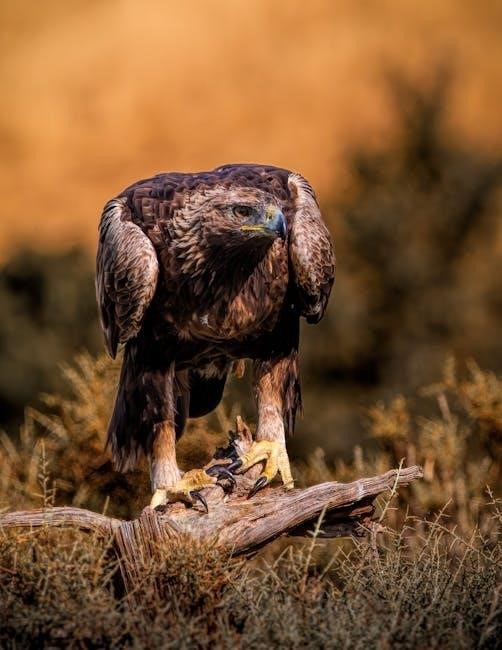
Understanding local regulations and laws is a critical step in becoming a hunting guide. Each state has its own set of rules governing hunting practices‚ licensing requirements‚ and permitted areas. Start by contacting your state’s wildlife agency to familiarize yourself with specific regulations. Obtain the necessary permits and licenses‚ as these are often mandatory for guiding. Knowledge of seasonal restrictions‚ bag limits‚ and protected species is essential to ensure compliance. Additionally‚ understand land-use laws‚ as hunting on private or public lands may require special permits. Ethical hunting practices and adherence to wildlife conservation laws are also vital to maintain a positive reputation and avoid legal penalties. Stay updated on any changes in regulations‚ as these can vary annually. By thoroughly understanding and respecting local laws‚ you can operate legally‚ safely‚ and responsibly‚ ensuring a positive experience for both you and your clients. This knowledge also helps in educating hunters about ethical practices and conservation efforts‚ fostering a deeper appreciation for wildlife and the environment.
First Aid and Emergency Response Training
First aid and emergency response training is crucial for aspiring hunting guides‚ as they often operate in remote areas with limited access to medical care. Accidents‚ injuries‚ or sudden illnesses can occur‚ and being prepared to respond effectively is essential. Start by enrolling in a wilderness first aid course‚ which teaches techniques for treating injuries in remote settings. Learn how to assess injuries‚ control bleeding‚ and stabilize fractures. Understanding how to recognize and manage conditions like shock‚ hypothermia‚ and heatstroke is also vital. Additionally‚ familiarize yourself with the proper use of first aid kits tailored for hunting environments. Emergency response training should include knowing how to navigate using GPS or a compass‚ as well as how to communicate effectively in areas with no cell service. Practice building shelters and starting fires to keep clients safe in extreme weather conditions. Consider obtaining certifications like CPR and Automated External Defibrillator (AED) training. Staying calm and making sound decisions during emergencies is just as important as technical skills. By mastering first aid and emergency response‚ you ensure the safety and well-being of both yourself and your clients‚ building trust and reliability as a guide.
Firearms Safety and Handling
Firearms safety and handling are paramount for hunting guides‚ as they are responsible for ensuring the safety of both themselves and their clients. Start by mastering the fundamental rules of firearm safety: always treat every firearm as if it were loaded‚ never point a firearm at anything you do not intend to shoot‚ and keep your finger off the trigger until you are ready to fire. These principles are non-negotiable and must be strictly enforced with clients‚ especially those with less experience.
Additionally‚ stay informed about local laws and regulations regarding firearm use and storage. Guides must ensure that all clients have the necessary permits and that firearms are stored securely when not in use. Regular maintenance and inspection of firearms are also critical to prevent malfunctions and ensure reliability in the field.
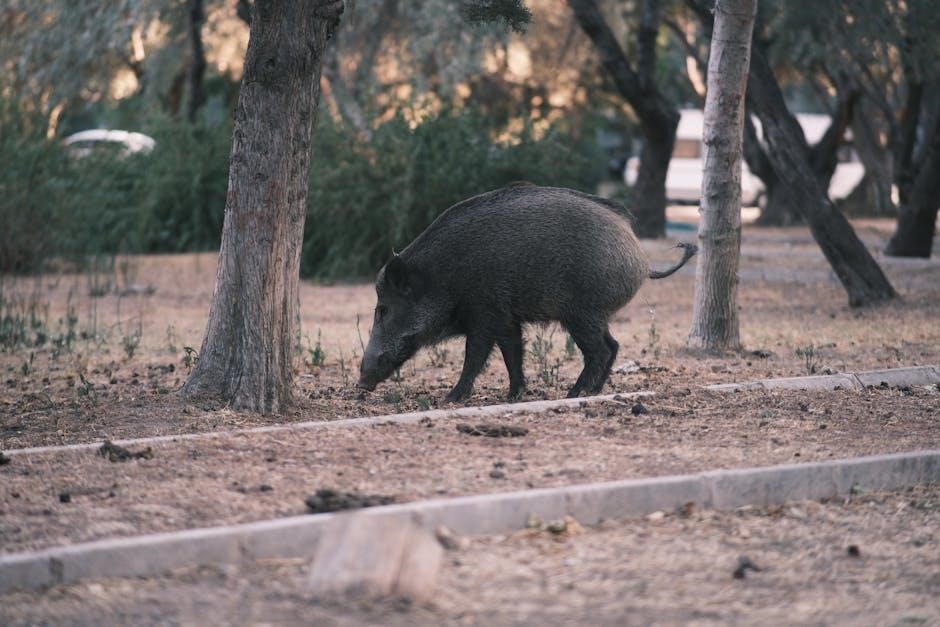
Consider obtaining certifications‚ such as those offered by the NRA‚ to demonstrate proficiency in firearm safety and handling. In an emergency‚ knowing how to respond to accidents‚ such as a misfire or accidental discharge‚ is essential. This includes providing immediate first aid and managing the situation until professional help arrives.
Finally‚ always assess the skill level of your clients and provide additional instruction if needed. Be mindful of environmental factors like weather and terrain‚ which can impact firearm safety. By combining knowledge‚ training‚ and vigilance‚ you can create a safe and responsible hunting environment for everyone involved.
Knowledge of Wildlife and Ecosystems
A deep understanding of wildlife and ecosystems is essential for aspiring hunting guides. This knowledge allows guides to effectively track and locate game‚ ensuring successful hunting experiences for clients. Start by studying the behavior‚ habitat‚ and migration patterns of various game species‚ as well as their dietary needs and social structures. Understanding these aspects will help you predict where and when animals are most active‚ increasing the likelihood of a successful hunt.
Additionally‚ familiarize yourself with the local flora and fauna‚ as they play a critical role in the ecosystem. Knowing which plants are edible or toxic‚ for example‚ can be vital for survival in remote areas. Learn about the interconnectedness of species and how human activities impact the environment. This knowledge not only enhances your guiding skills but also promotes ethical and sustainable hunting practices.
Stay informed about wildlife conservation efforts and seasonal changes in animal populations. Collaborate with biologists‚ wildlife managers‚ and other experts to gain insights into local ecosystems. By combining field experience with scientific knowledge‚ you can provide clients with a well-rounded and educational hunting experience while preserving the natural balance of the environment.
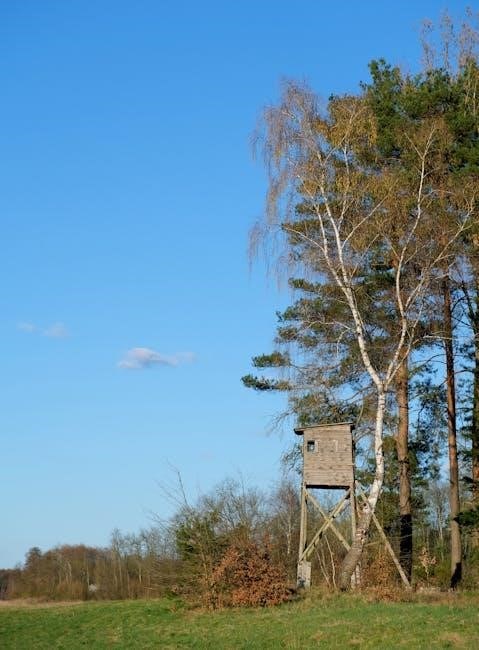
Continuous learning is key‚ as wildlife dynamics and ecosystems are constantly evolving. Stay updated on new research and adapt your strategies accordingly to remain an effective and knowledgeable guide.
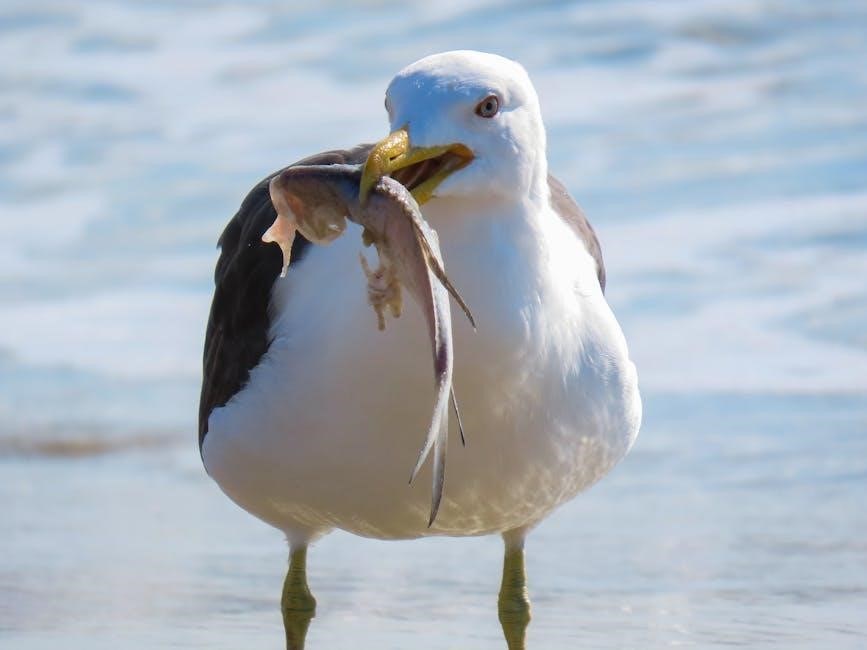
Scouting and Tracking Techniques
Mastering scouting and tracking techniques is crucial for hunting guides to locate game effectively. Start by learning to identify animal signs‚ such as footprints‚ droppings‚ and rubs‚ which indicate the presence and movement of wildlife. Practice observing these signs in various terrains and conditions to refine your skills. Understanding how weather‚ such as rain or snow‚ affects tracks can also improve your ability to follow game.
Use binoculars and spotting scopes to survey large areas for animal activity from a distance. This helps in identifying patterns‚ such as feeding grounds or watering holes‚ where game is likely to be found. Timing your scouts during early morning or late evening‚ when animals are most active‚ increases the chances of spotting them.
Develop patience and attention to detail‚ as tracking often requires hours of careful observation. Learn to move quietly and remain camouflaged to avoid spooking animals. Additionally‚ study the behavior of different species to anticipate their movements and habitats. By combining these techniques‚ you can lead clients to successful hunting opportunities while demonstrating your expertise as a guide.
Regular practice and experience in the field will enhance your scouting and tracking abilities‚ making you a more effective and reliable hunting guide.
Off-Road Driving and Navigation Skills
Mastering off-road driving and navigation is essential for hunting guides‚ as many hunting locations are in remote‚ rugged areas inaccessible by standard vehicles. Begin by learning how to operate 4×4 vehicles‚ including understanding features like four-wheel drive‚ differential locks‚ and winching systems. Practice driving on various terrains‚ such as mud‚ sand‚ and rocky trails‚ to build confidence and control.
Navigation skills are equally critical. Familiarize yourself with GPS devices‚ compasses‚ and topographic maps to locate trails and hunting areas accurately. Learn to read terrain features‚ such as ridges‚ valleys‚ and water sources‚ to navigate without relying solely on technology. Additionally‚ understand how to assess trail conditions and avoid obstacles like deep water‚ steep inclines‚ and soft ground.
Develop situational awareness to stay safe while driving off-road. This includes knowing your vehicle’s limits‚ checking weather forecasts‚ and carrying emergency supplies like a winch‚ tow strap‚ and first aid kit. Regular maintenance of your vehicle is also vital to ensure reliability in remote areas.
By honing these skills‚ you’ll be able to safely and efficiently transport clients to prime hunting locations‚ enhancing their experience and your reputation as a guide.
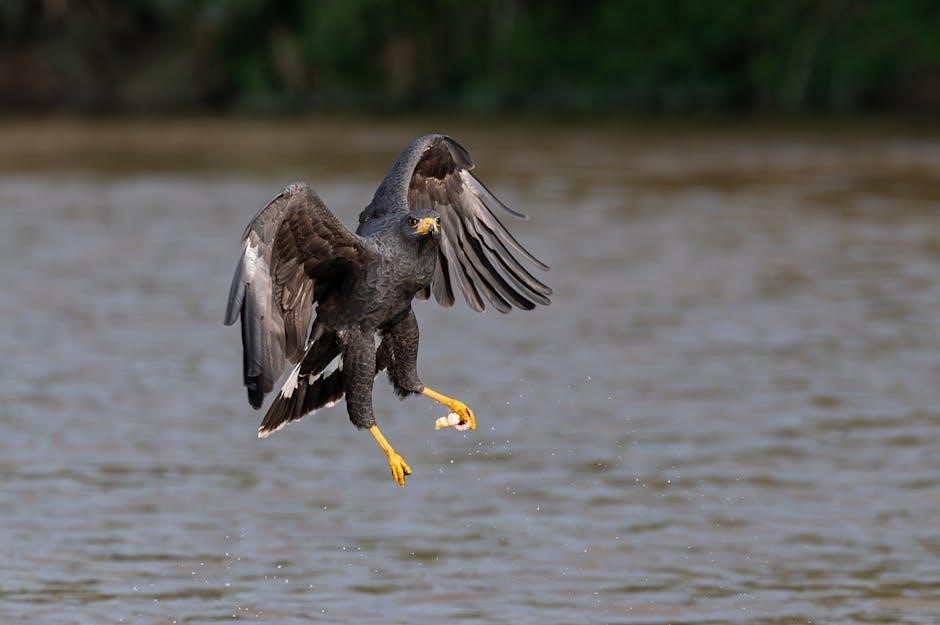
Communication and Leadership Abilities
Effective communication and strong leadership are vital skills for a hunting guide to ensure a safe and successful experience for clients. Clear communication helps convey instructions‚ safety protocols‚ and strategies‚ while also building trust and rapport with clients. Practice active listening to understand clients’ needs‚ preferences‚ and concerns‚ and adapt your communication style to suit different personalities and skill levels.
Leadership involves making sound decisions‚ maintaining composure under pressure‚ and inspiring confidence in your clients. Develop the ability to think critically and solve problems quickly‚ especially in challenging situations like unpredictable weather or wildlife encounters. Cultivate a positive attitude and enthusiasm to keep clients motivated and engaged throughout the hunt.
Learn to manage group dynamics effectively‚ ensuring everyone works together as a team. This includes mediating conflicts‚ assigning tasks‚ and providing constructive feedback. Additionally‚ be approachable and patient‚ as clients may vary in experience and physical ability. By refining your communication and leadership skills‚ you can create a positive‚ productive environment that enhances the hunting experience for all participants.
Client Management and Customer Service
Effective client management and exceptional customer service are critical for building a loyal client base and maintaining a successful career as a hunting guide. Understanding your clients’ expectations‚ skill levels‚ and goals ensures tailored experiences that meet their needs. Clear pre-hunt communication helps set realistic expectations and establishes trust;
During the hunt‚ prioritize client safety and satisfaction by providing expert guidance‚ support‚ and encouragement. Be attentive to their needs‚ offering assistance with equipment‚ techniques‚ and navigation. Positive attitudes and patience‚ especially with novice hunters‚ foster a enjoyable environment and enhance client satisfaction.
After the hunt‚ gather feedback to improve future experiences and maintain relationships. Responsive communication and appreciation for their business strengthen client loyalty. Excellent customer service and personalized care differentiate you from competitors‚ leading to referrals and repeat business.
By focusing on client satisfaction and delivering memorable experiences‚ you establish a reputation as a dependable‚ professional hunting guide‚ ensuring long-term success in the industry.
Starting Your Own Outfitting Business
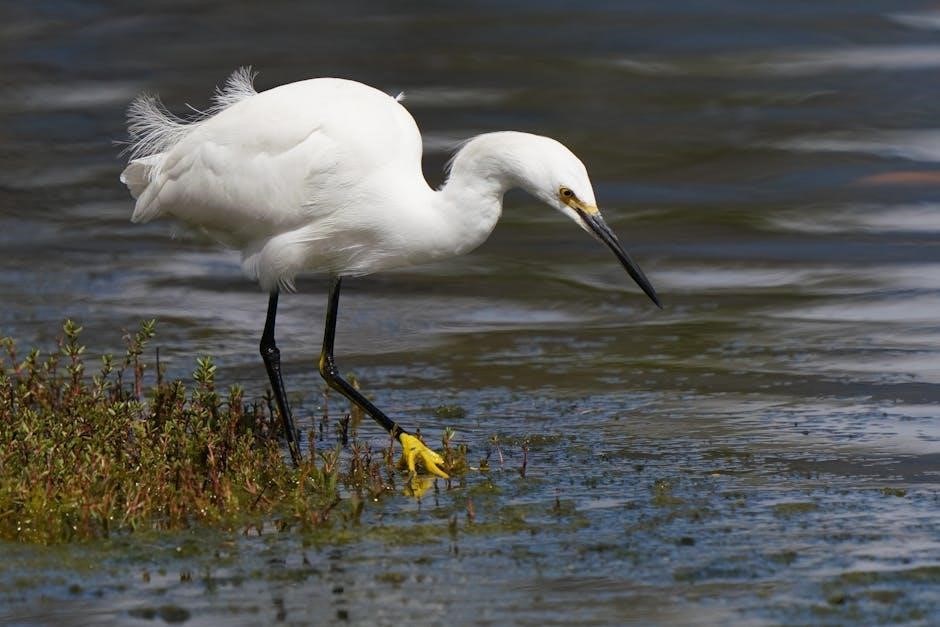
Starting your own outfitting business requires careful planning and execution to ensure success. Begin by conducting market research to identify demand‚ competition‚ and potential clients. Develop a detailed business plan outlining your goals‚ target market‚ pricing‚ and operational strategies. Secure a prime location for your base of operations‚ ensuring access to quality hunting areas and necessary infrastructure.
Register your business and obtain all required licenses‚ permits‚ and insurance. Build a strong brand identity‚ including a professional website and marketing materials‚ to attract clients. Network with other guides‚ outfitters‚ and suppliers to establish relationships and secure resources. Hire experienced staff and guides who share your commitment to safety and customer satisfaction.
Invest in high-quality equipment‚ vehicles‚ and gear to provide a professional service. Start small‚ focusing on a few specialized hunts or species‚ and gradually expand as your business grows. Stay adaptable to changing market trends and client preferences to remain competitive. By combining passion‚ expertise‚ and sound business practices‚ you can build a thriving outfitting business.
Continuous Learning and Professional Development
Continuous learning and professional development are essential for a successful career as a hunting guide. The hunting industry evolves with new techniques‚ technologies‚ and regulations‚ so staying informed is crucial. Attend workshops‚ seminars‚ and online courses to enhance your skills in areas like wildlife management‚ first aid‚ and conservation.
Join professional associations‚ such as the National Rifle Association (NRA) or local guide associations‚ to network with peers and access resources. Pursue advanced certifications‚ such as wilderness first responder or specialized hunting certifications‚ to stand out in the field. Stay updated on local‚ state‚ and federal regulations to ensure compliance and maintain a reputation for professionalism.
Engage in hands-on training to refine skills like tracking‚ navigation‚ and firearms handling. Seek mentorship from experienced guides to gain insights and best practices. Embrace a mindset of lifelong learning to adapt to changing environments‚ client expectations‚ and industry standards. By committing to continuous improvement‚ you’ll remain competitive and provide exceptional experiences for your clients.
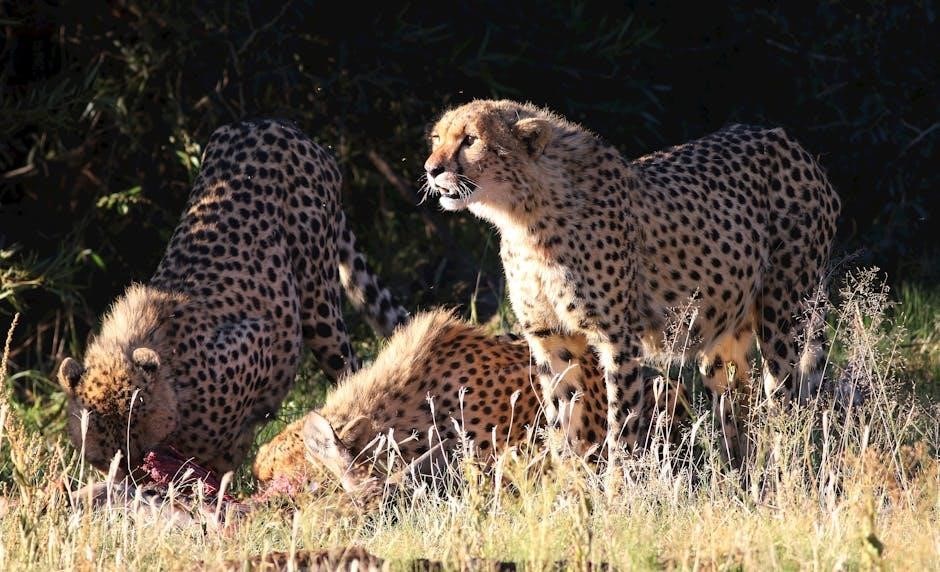
Final Tips for Success as a Hunting Guide

Becoming a successful hunting guide requires a combination of passion‚ dedication‚ and resilience. Always prioritize safety‚ preparedness‚ and adherence to ethical hunting practices. Develop a keen sense of observation and instincts to anticipate challenges in the field. Be adaptable to varying weather conditions‚ terrain‚ and client needs‚ ensuring flexibility in your strategies.
Focus on building lasting relationships with clients by providing exceptional experiences and personalized attention. A positive attitude‚ patience‚ and strong communication skills will help you connect with clients and create memorable hunts. Stay humble and willing to learn from every outing‚ as no two hunts are the same.
Additionally‚ cultivate a deep respect for nature and wildlife‚ promoting conservation and sustainable hunting practices. Surround yourself with experienced mentors and peers who can offer guidance and support. Finally‚ embrace the lifestyle fully‚ as being a hunting guide is not just a job but a way of life. By combining these traits and practices‚ you’ll build a rewarding and respected career as a hunting guide.
